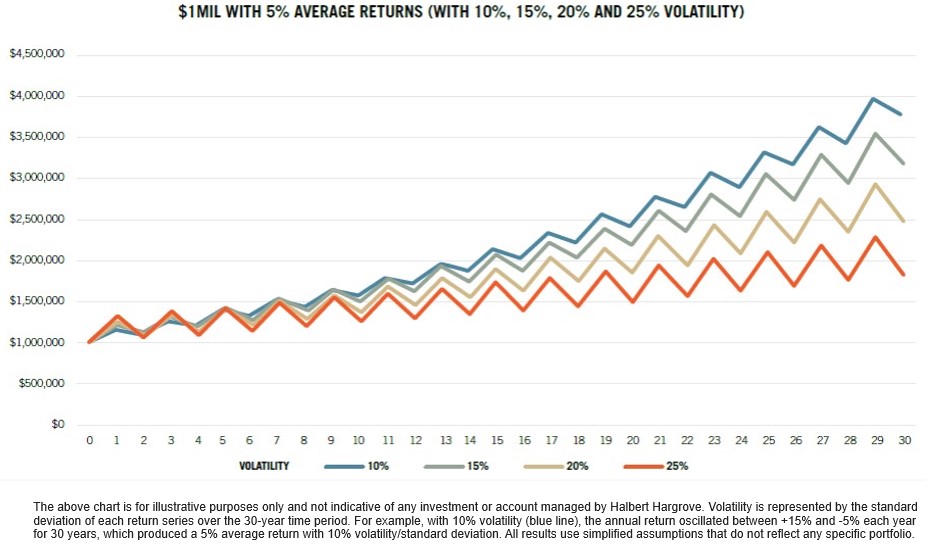Want to Get Rich and Stay Rich? Avoid 10 Investing Mistakes
Doing everything right isn’t a guarantee, but knowing where it’s easy to go wrong can make a big difference when it comes to gaining an edge.


Profit and prosper with the best of Kiplinger's advice on investing, taxes, retirement, personal finance and much more. Delivered daily. Enter your email in the box and click Sign Me Up.
You are now subscribed
Your newsletter sign-up was successful
Want to add more newsletters?

Delivered daily
Kiplinger Today
Profit and prosper with the best of Kiplinger's advice on investing, taxes, retirement, personal finance and much more delivered daily. Smart money moves start here.

Sent five days a week
Kiplinger A Step Ahead
Get practical help to make better financial decisions in your everyday life, from spending to savings on top deals.

Delivered daily
Kiplinger Closing Bell
Get today's biggest financial and investing headlines delivered to your inbox every day the U.S. stock market is open.

Sent twice a week
Kiplinger Adviser Intel
Financial pros across the country share best practices and fresh tactics to preserve and grow your wealth.

Delivered weekly
Kiplinger Tax Tips
Trim your federal and state tax bills with practical tax-planning and tax-cutting strategies.

Sent twice a week
Kiplinger Retirement Tips
Your twice-a-week guide to planning and enjoying a financially secure and richly rewarding retirement

Sent bimonthly.
Kiplinger Adviser Angle
Insights for advisers, wealth managers and other financial professionals.

Sent twice a week
Kiplinger Investing Weekly
Your twice-a-week roundup of promising stocks, funds, companies and industries you should consider, ones you should avoid, and why.

Sent weekly for six weeks
Kiplinger Invest for Retirement
Your step-by-step six-part series on how to invest for retirement, from devising a successful strategy to exactly which investments to choose.
Sometimes it’s not making all the right moves but avoiding making the wrong ones that can make all the difference. Take investing, for instance. Simply avoiding making easy mistakes can be enough to give you the edge you’re looking for.
Here are some of the most common errors I see people making.
1. Investing in a brand as opposed to trusting the data.
Just because it’s from a well-known and widely respected investment manager doesn’t mean it’s a fit for your portfolio. Be sure to look at historical returns and think critically about the nature of the investment itself. Ask yourself what might put those continued returns at risk.
From just $107.88 $24.99 for Kiplinger Personal Finance
Become a smarter, better informed investor. Subscribe from just $107.88 $24.99, plus get up to 4 Special Issues

Sign up for Kiplinger’s Free Newsletters
Profit and prosper with the best of expert advice on investing, taxes, retirement, personal finance and more - straight to your e-mail.
Profit and prosper with the best of expert advice - straight to your e-mail.
2. Chasing returns vs. “not losing money.”
Fortunes are made by not losing money as opposed to chasing the next big thing. Take a look at the chart below from investment firm Halbert Hargrove. All of the portfolios have a starting value of $1 million and represent an average return of 5%. The difference in all four is the volatility they experience. The portfolio with the lowest volatility has a value of $3.8 million by year 30. The portfolio with the most amount of volatility has a value of $1.8 million by year 30.

3. There’s no such thing as “risk-free investing.”
If it sounds too good to be true, it typically is. This age-old adage applies to investing as well. Much like what the salesman is trying to pitch you on, if an investment professional is trying to sell you something that seems implausible, take another look. Chances are, there’s a catch.
We’ve all heard of Ponzi schemes, get-rich-quick schemes and, of course, the pump and dump, made popular by crypto and meme stocks. It's important to thoroughly research any investment opportunity and consult with a financial professional before investing your money.
4. Following the crowd leads to buying the top (hype) and selling the bottom (fear).
There’s no better example of this in recent memory than the meme stock craziness that took hold in 2020 and 2021.
One of the most well-known examples is GameStop, a struggling video game retailer that was heavily shorted by hedge funds. A group of Reddit users from the WallStreetBets subreddit encouraged others to buy GameStop stock, causing the stock price to skyrocket. It went from trading at around $18 per share in early January 2021 to a high of over $347 per share on Jan. 27, 2021.
This sudden rise caused significant losses for some hedge funds that had bet against the stock, including Melvin Capital. The fund reportedly lost around 53% of its value in January 2021 as a result of the short squeeze.
5. Not performing your own diligence.
It’s never been easier or cheaper to take the time to self-educate. Even when it comes to sophisticated alternative investments, there are resources, like the Equi Learn page. Investment diligence includes researching the company or asset, analyzing the financials, assessing management and leadership, evaluating the competitive landscape and considering the risks.
If you’re going to rely on someone else to perform your diligence for you, then you better make sure to perform your diligence on them! Ensure they’re properly qualified and experienced to do so.
6. Taking concentration risk instead of diversifying.
Concentration risk can take a number of forms. It could be investing in one company, one sector, one geography, you name it. This is also where having a strong alternative investment portfolio becomes critical. Most public-traded investments are correlated to changes in fiscal and monetary policy — just look at what happened in 2022.
For example, if an investor holds a significant portion of their portfolio in real estate assets, they are taking on a concentration risk that the performance of the real estate market could significantly impact their portfolio's returns.
To manage concentration risk, investors can diversify their portfolio across a range of different assets, sectors and geographic regions. By spreading their investments across a variety of different holdings, investors can help to reduce the impact of any one asset or sector on their overall portfolio performance.
7. Holding too much cash.
Especially in a world where inflation is higher than historical averages, sitting on cash can harm your returns. This doesn’t mean you need to put all your liquid funds in highly volatile assets, but there are plenty of low-risk options on the market today: alternative investments, index funds, treasuries and certificates of deposit are all great options.
In fact, this is the most attractive Treasuries have been in decades, meaning there’s no excuse not to take advantage of “the world’s safest borrow.” The opportunity cost of holding cash is extremely high, so don’t let a desire for “safety” destroy your chances of compounding your wealth or losing value to inflation.
8. Failing to adjust the amount of risk in your portfolio.
What’s appropriate for my 26-year-old colleagues is not appropriate for my parents or the average retiree. As you enter new stages of life, you should rethink what’s appropriate and how much risk you can afford to take.
The younger you are, the more risk you can handle since your investing horizon is very long. But as you get closer to retirement, the name of the game is preserving capital.
9. Following the advice of gurus as opposed to thinking for yourself.
Following financial gurus can be entertaining, but I never make an investment decision based on their advice. Being rich doesn’t mean you know how to help other people get rich, and their advice makes broad assumptions about human behavior.
Always be sure to check their credentials and do research for yourself, especially if their advice falls into the “too good to be true” category.
10. Don’t let your portfolio ruin your life.
You only live once. Money is simply a tool to help you accomplish your goals in life. Don’t make the pursuit of money the goal itself, because your investing and your life will suffer as a result.
This is where a partner like Equi can help. Our platform is a tech-enabled asset manager that relies on sophisticated data and a specialized diligence team to offer portfolios of what we believe to be the top alternative investment products.
This is the most “hands-off” and streamlined approach and can save you a lot of stress if trying to avoid all of these mistakes sounds like too much to handle on your own.
Please see important disclosures for Equi (Equilibrium Ventures, LLC) at www.equi.com/blog.
Profit and prosper with the best of Kiplinger's advice on investing, taxes, retirement, personal finance and much more. Delivered daily. Enter your email in the box and click Sign Me Up.

Tory Reiss is a three-time founder of venture capital-backed financial technology startups. He’s currently the CEO of Equi, the elite destination for alternative investments. It is equal parts hedge fund and technology platform, with exclusive access to a variety of uncorrelated alternative investments.
-
 Ask the Tax Editor: Federal Income Tax Deductions
Ask the Tax Editor: Federal Income Tax DeductionsAsk the Editor In this week's Ask the Editor Q&A, Joy Taylor answers questions on federal income tax deductions
-
 States With No-Fault Car Insurance Laws (and How No-Fault Car Insurance Works)
States With No-Fault Car Insurance Laws (and How No-Fault Car Insurance Works)A breakdown of the confusing rules around no-fault car insurance in every state where it exists.
-
 7 Frugal Habits to Keep Even When You're Rich
7 Frugal Habits to Keep Even When You're RichSome frugal habits are worth it, no matter what tax bracket you're in.
-
 For the 2% Club, the Guardrails Approach and the 4% Rule Do Not Work: Here's What Works Instead
For the 2% Club, the Guardrails Approach and the 4% Rule Do Not Work: Here's What Works InsteadFor retirees with a pension, traditional withdrawal rules could be too restrictive. You need a tailored income plan that is much more flexible and realistic.
-
 Retiring Next Year? Now Is the Time to Start Designing What Your Retirement Will Look Like
Retiring Next Year? Now Is the Time to Start Designing What Your Retirement Will Look LikeThis is when you should be shifting your focus from growing your portfolio to designing an income and tax strategy that aligns your resources with your purpose.
-
 I'm a Financial Planner: This Layered Approach for Your Retirement Money Can Help Lower Your Stress
I'm a Financial Planner: This Layered Approach for Your Retirement Money Can Help Lower Your StressTo be confident about retirement, consider building a safety net by dividing assets into distinct layers and establishing a regular review process. Here's how.
-
 The 4 Estate Planning Documents Every High-Net-Worth Family Needs (Not Just a Will)
The 4 Estate Planning Documents Every High-Net-Worth Family Needs (Not Just a Will)The key to successful estate planning for HNW families isn't just drafting these four documents, but ensuring they're current and immediately accessible.
-
 Love and Legacy: What Couples Rarely Talk About (But Should)
Love and Legacy: What Couples Rarely Talk About (But Should)Couples who talk openly about finances, including estate planning, are more likely to head into retirement joyfully. How can you get the conversation going?
-
 How to Get the Fair Value for Your Shares When You Are in the Minority Vote on a Sale of Substantially All Corporate Assets
How to Get the Fair Value for Your Shares When You Are in the Minority Vote on a Sale of Substantially All Corporate AssetsWhen a sale of substantially all corporate assets is approved by majority vote, shareholders on the losing side of the vote should understand their rights.
-
 How to Add a Pet Trust to Your Estate Plan: Don't Leave Your Best Friend to Chance
How to Add a Pet Trust to Your Estate Plan: Don't Leave Your Best Friend to ChanceAdding a pet trust to your estate plan can ensure your pets are properly looked after when you're no longer able to care for them. This is how to go about it.
-
 Want to Avoid Leaving Chaos in Your Wake? Don't Leave Behind an Outdated Estate Plan
Want to Avoid Leaving Chaos in Your Wake? Don't Leave Behind an Outdated Estate PlanAn outdated or incomplete estate plan could cause confusion for those handling your affairs at a difficult time. This guide highlights what to update and when.